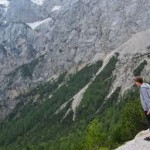 Many times over the past twenty months of caring for my parents I have dwelt on dark thoughts. Thoughts that most my age don’t want to acknowledge, much less linger over, bring out and share around like some bit of news on the latest medical breakthrough for cancer, worn out knees, lost hearing or broken teeth.
Many times over the past twenty months of caring for my parents I have dwelt on dark thoughts. Thoughts that most my age don’t want to acknowledge, much less linger over, bring out and share around like some bit of news on the latest medical breakthrough for cancer, worn out knees, lost hearing or broken teeth.
Many of my friends, a generation of women who came later in life to motherhood for whatever reasons are too busy running carpool, arranging play-dates or perhaps even changing diapers to probably think like I was. Life is full, life is long, life is good so why peak behind the curtain that separates us from old age, and all that comes with it?
But I couldn’t help thinking these thoughts. The double combination of caring for elderly parents and being a planner can do it to you – will force those thoughts right up front, make you look them in the eye, lose sleep over them.
Indeed, during the last year I often felt as if I was on the top of a steep hill, a mountain, a precipice, peering over the edge into a side of life I had not contemplated, let alone lived in the midst of before now – before my life was filled with studying up on the ills of the elderly, contemplating the best way to get my father in and out of a car, or how to talk to my mother about dying without ignoring her need to live.
Before my parents’ care became a daily topic in our house my husband and I talked only of nearing the “big five-oh”, raising children – some still in elementary school – and thinking that life would go on and on. The farthest our conversations went into the future were discussions of where to relocate upon retirement, how long it would take to put the last of these kids through college, and how happy we would be to deal with much less house. We figured life would just go on and on until we were ready to be done, much like my parents had thought I suppose. There was no need to plan, no need to consider alternatives, no need to think about the what-ifs.
Then my daily work changed and all I seemed to be able to do some days was stare down the other side of this hill called life – my foot about to step forward onto the path down the other side – and think aging thoughts.
Thoughts like: What will happen when I reach seventy, eighty, ninety. Where will I be? Will I get Cancer, Dementia, suffer a long protracted death by either, or just decay away, unable to do the most mundane and simple tasks anymore, dependent on others?
Thoughts like: Have we saved enough for retirement, for our later days, for our care? What if one – or both of us – gets terminally ill?
Thoughts like: Will my children be patient with me? Will I be patient with them? Will I take them from the plans they made, the need to care for me pushing into their lives, eating away at the edges of their precious downtime, their sanity? Will the children of my children, my precious grandbabies, grow up learning their parents’ good deeds, the meaning of serving others – most importantly the white-haired generation – and their parents’ failings, their lack of patience and understanding?
Thoughts like: What if we hoard all our money worrying about these things and they never come to pass? What if we miss the chance to live our life – the only life we get – to our fullest because we are worriers and save and plan and then in the end we have a pile of money and nothing to spend it on because we both keel over in our sleep or that bus-I-ordered-with-my-name-on-it strikes us down as we wait on the curb readied for the long drawn out death that will never come.
These thoughts were in and out of my mind, day after day until I picked up Jamie Zeppa’s autobiography Beyond the Earth and the Sky, about her three years teaching in Bhutan. I loved how Zeppa didn’t let worry, and what-ifs get in the way of a great unknown, an awesome adventure half a world away. I also enjoyed her sideline discussions on Buddhism, on living in the moment, on letting life just be, and learning to let go of expectations, good or bad in order to be content in the moment.
Zeppa was half my age when she made the decision to throw caution to the wind to go teach in some third-world country. And perhaps there is my problem, as I have neared the top of this mountain I have forgotten how to live a little, how to enjoy the time now, how to not necessarily throw caution to the wind, but at least hold it out to feel its enticing aroma.
Perhaps the one gift I can give myself as I turn fifty next week is to stand on this mountain top, with my arms out wide embracing the wind that blows across it.
